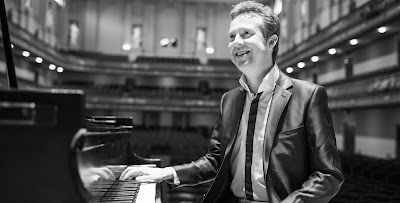 |
| Sam Haywood |
Reviewed by Robert Hugill on Sep 5 2017 Star rating:
Stanford's rarely performed preludes form the opening of a mixed Romantic recital
Charles Villiers Stanford's preludes remain a relatively undiscovered part of his output. A new recording from pianist Sam Haywood on Hyperion should hopefully help make them better known. On Tuesday 5 September 2017, Sam Haywood brought a group of five of Stanford's preludes to Rhinegold Live at Conway Hall as part of a programme which also included Robert Schumann's Papillons, Op.2, Chopin's Polonaise in F sharp minor, Op.44 and Mendelssohn's Andante and Rondo Capriccioso. The recital was followed by a short Q&A with Owen Mortimer, the editor of International Piano.
Stanford's preludes are relatively late works (written 1918 and 1921). Though inspired by the preludes of Bach, in style they reflect the composers who inspired Stanford. Like much of his late output, the music can seem relatively old fashioned for the period, but is beautifully wrought and we are now learning how it transcends our notions.
Prelude No. 24 in B minor, Op.163 made a stormy start to the evening, though Stanford allows the drama to evaporate occasionally. No. 38 in F sharp minor, Op.179 (Basso Ostinato) had a melody floating over an ostinato bass, but within this concept Stanford found plenty of harmonic richness and textural variety. Despite the subtitle Fughetta, for No. 37 in G flat major, Op.179 the work was rather perky and insouciant. No.8 in E flat minor (Study) was full of fluttering hands, yet Haywood played it quite strongly too. The final prelude in the group, No.21 in B flat major, Op.163 had the subtitle Carillon but the bells here were quite grandiose with a vigorously strenuous texture. Haywood played wiith greaat expressive variety and made a fine advocate for these pieces.
Haywood followed the Stanford with Schumann's 1831 piece, Papillons, Op.2 inspired by a masked ball in Jean Paul's novel Flegeljahre. Here Schumann gives us a series of short, characteristic scenes and Haywood brought out the alternation between robust and leggiero, between delicate moments and bravura gestures.
Chopin's Polonaise in F sharp minor, Op.44 dates from 1841 and is dedicated to a member of the Polish emigre community in Paris. Despite the work's name, it is in fact a large scale piece with a mazurka as the middle section. Haywood gave us a strongly coloured account of the work, full of dramatic rhythms, and crisp articulation, but still keeping the music nicely fluid.
Before the final work in the programme, Haywood gave us a short extra piece, a piece of his own which took its inspiration from Alfred Kubin's 1909 Surrealist novel Die andere Seite. This started off delicate and romantic, but there was a dark, angular and dramatic middle section, complex and violent, before the opening material returned transformed, ending in something rather haunting.
The final work in the programme was Mendelssohn's Andante and Rondo Capriccioso, Op.14. The opening Andante moved from a lyrical and elegant singing melody to something rather dramatic, before the Rondo introduced us to the Fairies. Mendelssohn weaves the Fairy scherzo element into a romantic melody, and Haywood created something rather dazzling.
Afterwards there was a Q&A between Sam Haywood and Owen Mortimer. Haywood explained that he first came across the Stanford preludes 20 years ago, but only more recently became aware of their true value and he feels that they are unjustly neglected. He commented on how the preludes show the influence of the composers Stanford worshipped such as Brahms and Beethoven, but that Stanford's own strong voice comes through as well. He enjoys playing them, and the frustrated organist in him enjoys the way Stanford brings organ-like textures into some of the pieces.
Haywood's first project with Hyperion was recording a disc of music by Julian Isserlis (cellist Steven Isserlis's Russian-born grandfather), and the idea of the Stanford preludes arose as a follow up.
Haywood also has other strings to his bow, being a composer and the director of the Solent Music Festival in Lymington (which starts on 13 September 2017). He feels that it is important to compose, and give him a different perspective on what he is playing. As a festival director he finds it interesting to see things from a promoter's point of view as well as that of a musician.
Elsewhere on this blog:
- Holy chants and apocalyptic mayhem: I Musicanti at St John's Smith Square - concert review
- Neglected Schubert: Daniel Behle in operatic arias - CD review
- An evening of theatrical magic: British Youth Opera in Judith Weir's The Vanishing Bridegroom - opera review
- Glass & more: The Baltic Sea Philharmonic's debut at the Elbphilharmonie in Hamburg - concert review
- Ideas and creative energy: Frank Castorf's production of Wagner's Ring Cycle at Bayreuth - Opera review
- Mozart's La Clemenza di Tito at the BBC Proms - opera review
- Weekend reading The rise, fall and gradual resurgence of Meyerbeer's French operas, a story of stylistic change, anti-Semitism and personal spite - feature article
- Debut recital: Luc Robert in Verdi arias - CD review
- Riveting and exciting: Die Meistersinger from Bayreuth - Opera review
- Magnificent staging: Wagner's Parsifal at Bayreuth - Opera review
- Viola & accordion: Duo van Vliet's Lachrymae ReVisited - CD review
- Powerful, compelling, satisfying: Tristan und Isolde at the Bayreuth Festival - opera review
- Home











No comments:
Post a Comment